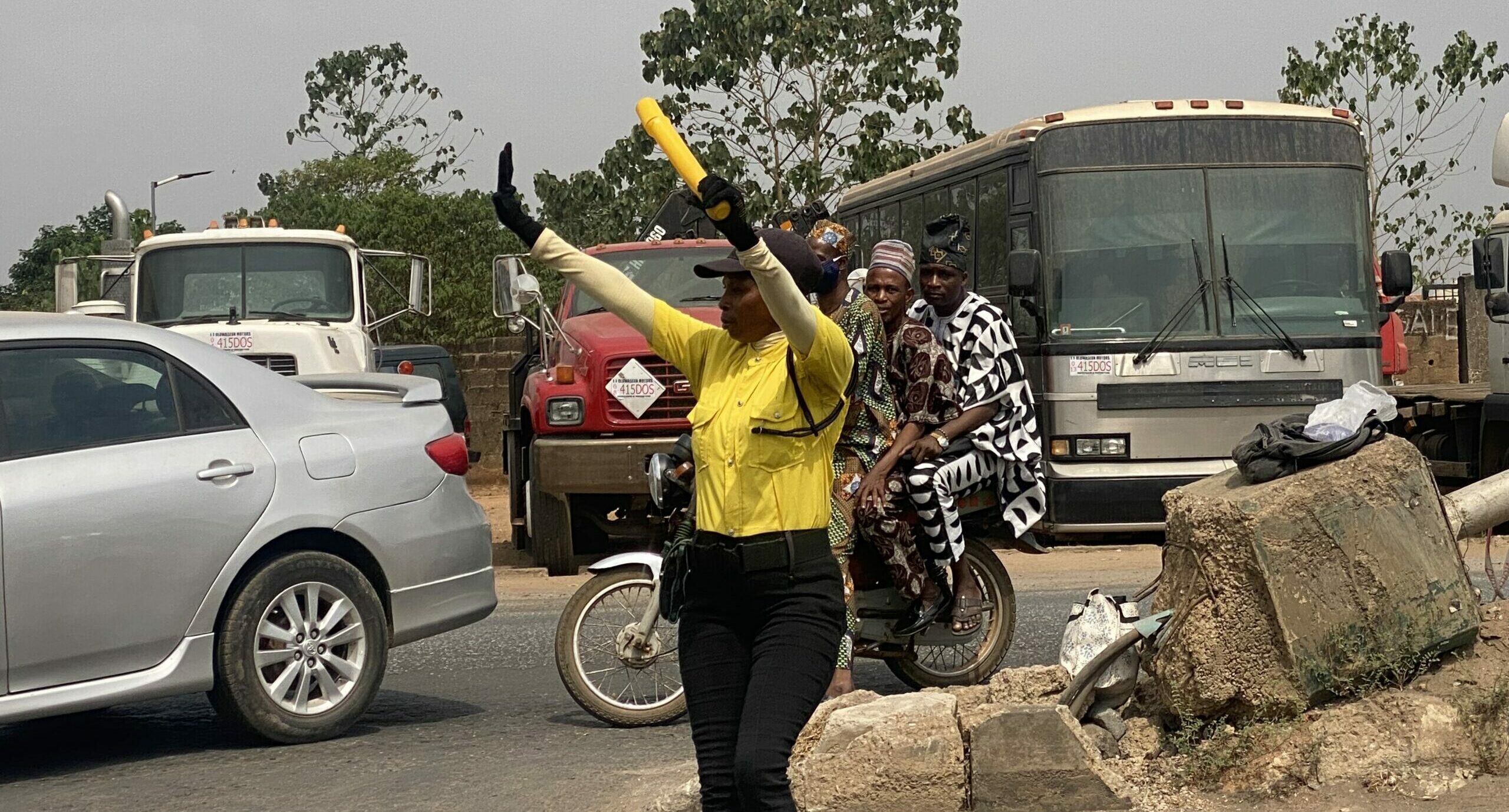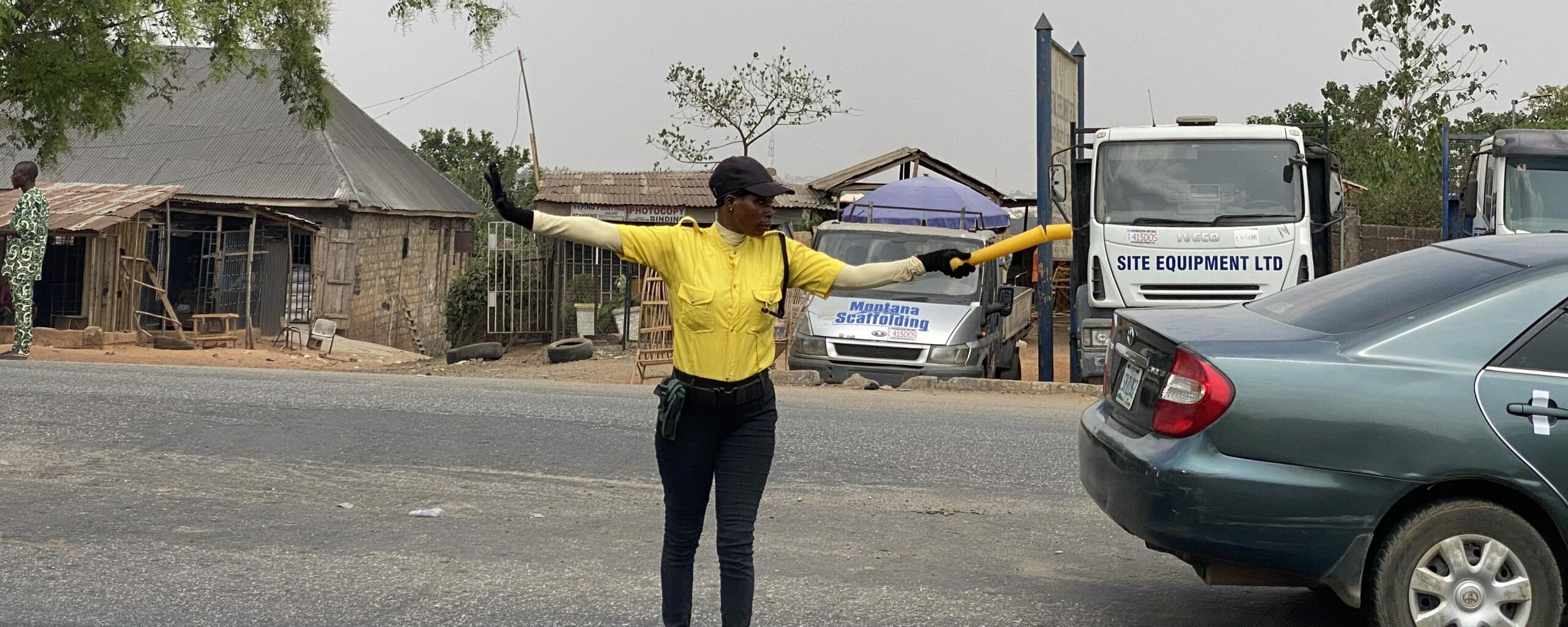Features
Joy on The Road – Fauzziyah Oyebode on Finding Purpose as a Traffic Warden in Osogbo

Fauzziyah Oyebode. Shot by Ahmad Adedimeji Amobi
OSOGBO – From afar, the yellow and black uniform of Fauzziyah Oyebode is visible. It’s about 3 p.m. and the scorching sun exposes the speckles of sweat beneath her face cap. She raises her hands and uses one to stop the cars revving towards the Aregbe lane and signals to the cars in the other lane revving towards Ataoja to pass through. Immediately cars ease off in a lane, she hurries to the other to pass the cars through. She stands there in the middle of the road as cars zoom past her through her sides, unperturbed, as though the cars have promised not to run her over. But she’s aware of the danger that faces her every day as a traffic warden. For instance, a traffic warden was assaulted by the governor’s aide in Kwara State. And in Oyo State, some commercial drivers murdered a traffic warden.
Fauzziyah fears becoming a number in the data of assaulted and murdered traffic wardens so she tries to absorb the anger of the road users every day without reacting. Cars have tried to run over her, hateful words have been hurled at her and she has been ridiculed for being a female traffic warden in a job that’s societally perceived as reserved for men. Amidst these challenges, she refrains from reacting with anger, choosing instead to respond with smiles or pleas.

Fauziyyah Oyebode at work. Shot by Ahmad Adedimeji Amobi
“My oga, my oga. Morning, sir” she salutes a red shiny Corrola that honks at her. “You have to salute and respect everybody on the road. Many of them don’t know what they are driving,” she says.
In recent times, Nigerian women have been defying the norm by taking up roles and jobs that are traditionally dominated by men. According to a report by the Council on Foreign Relations’ Women and Foreign Policy Programme on laws holding women back, if women participated in the economy to the same extent as men, Nigeria’s gross domestic product could grow by 23 per cent by 2025. The International Monetary Fund further argues that gender equality in workplaces could strengthen Nigeria’s economic stability. Research shows that when women are employed and have access to resources and income, it has a direct impact on poverty reduction. They are better able to support their families, ensuring better health, education, and overall well-being for their children.

Oyebode Fauzziyah at work. Shot Ahmad Adedimeji Amobi
“I don’t think there’s any job a man does that I can’t do. I will surely try my best. I believe that when women take up roles like this, it gives us visibility. Women need to be visible too.”
Every day, the mother of four wakes up at 5 a.m. to observe her prayer. She also wakes her children and prepares them for school. By 6:45 a.m., she waves goodbye to her husband to resume on the road by 7 a.m. Until 6 in the evening, she energetically jumps between lanes as the sun rises and falls. It has been the same cycle since she was recruited to the job in 2012 after she was laid off from the disbanded cleaning empowerment scheme in the state, O-YES. Despite working for many years, she says her job is still “partial” employment but she’s working hard to become a civil servant.
“I have focus,” Fauzziyah says.
Since she started, her salary of N10,000 has been the same even as the economy grapples with inflation and the escalating cost of living. The removal of fuel subsidies by President Bola Tinubu in May 2023 prompted economic hardship and tripled the prices of commodities, worsening the lives of over 133 million Nigerians (67%) living in multidimensional poverty.
“Serious calculation and managing,” she explains, is how she survives despite economic hardship. She has cut down several expenses to keep up. “The money is nothing. It solves almost nothing, but I’m working hard.”
She leans against the broken brick to catch her breath, her eyes darting left and right vigilantly. After a brief moment, she resumes the routine of her work. A man approaches her and politely asks if he could take one of her sachets of water.
“Sure thing,” she replies casually, without glancing in his direction. The money might not compensate Oyebode’s efforts, but she’s happy to be involved in something that gives her joy. She would be back here tomorrow and the day after, persisting until she attains her dream.




















